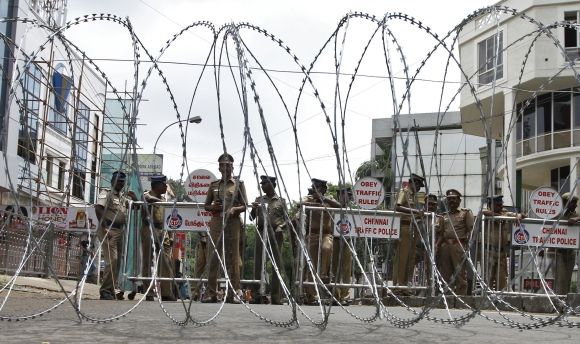 Has the political link between Tamils in Tamil Nadu and Sri Lanka been broken at last?
Has the political link between Tamils in Tamil Nadu and Sri Lanka been broken at last?
The results of the recent presidential elections in Sri Lanka are likely to have stunned groups in Tamil Nadu that have been giving moral and material support to Tamils in the north and east of the island for decades. Tamil Nadu-based groups had asked Sri Lanka Tamils to protest against the election and boycott voting.
The election results show a disconnect between those in Tamil Nadu who advocate Tamil Eelam and the Sri Lanka Tamils, say experts.
The Dravidian political parties, peripheral groups and a few extremist elements in Tamil Nadu have always been quick to voice an opinion about anything that happens in Sri Lanka. This is seen as natural in Tamil Nadu and resented deeply in non-Tamil Sri Lanka.
The assassination of former Prime Minister Rajiv Gandhi, by the Liberation Tigers of Tamil Eelam in 1991 with considerable local assistance, was the turning point.
Almost all the militant groups supporting Sri Lanka Tamils based in Tamil Nadu were asked to wind up their operations. In some cases, they were hunted down. So while the sentiment in Tamil Nadu has always tilted towards those fighting for the rights of Tamils in Sri Lanka, organised support to the cause has been dwindling.
The Eelam War IV ended on May 18, 2009, with the elimination of its top leaders, including Velupillai Prabhakaran. This seemed, initially, to give new fillip to groups in Tamil Nadu demanding justice for the Tamils in Sri Lanka.
For instance, in 2013, a protest started by a few students in Chennai grew to become a potential source of trouble. To ensure law and order, the government had to close down all engineering colleges indefinitely.
Earlier, Sri Lankan military personnel who were undergoing training at a defence forces training establishment at Wellington, Tamil Nadu, had to be asked to go back.
The junior Sri Lankan football team that came to play friendly matches against the Chennai Customs football team in Chennai was ordered to return. Sri Lankan pilgrims were attacked.
However, now, the results of Sri Lanka's presidential elections have shocked and stunned Tamil Nadu groups agitating for the Sri Lanka-Tamil cause.
While the Sri Lankan Tamil diaspora had asked Sri Lanka Tamils to boycott the elections, the Tamil National Alliance in Sri Lanka supported the common Opposition candidate, Maithripala Sirisena. Despite the Tamil Nadu call for a boycott, the turnout in the Tamil-speaking areas in Sri Lanka was better than expected.
In fact, Sirisena's victory has been attributed in large part to the votes of the Tamils and suggests Sri Lanka Tamils paid little or no attention to the boycott call and used their own political judgement.
"The voting pattern clearly shows that it is TNA's stand that was accepted by Sri Lanka Tamils and this is what has hit those who advocated boycott," says N Sathiya Moorthy, senior fellow at Observer Research Foundation, Chennai Chapter, and a close follower of Tamil politics.
He says that while fringe groups that support extremist activity still exist in Tamil Nadu and are closely watched by police, there is no major threat to Sri Lanka from Tamil Nadu.
"The connectivity and understanding of Tamil politicians in Tamil Nadu about the Sri Lanka Tamils after the final war between the LTTE and Sri Lanka Army was almost non-existent. While the TNA has been working in Sri Lanka to bring about a political solution to the decades-long ethnic war, politicians and the vociferous section of the Tamil diaspora in Tamil Nadu are still stuck in the pre-war mindset," he said.
One possible outcome of the election in Sri Lanka is that political parties in Tamil Nadu, which have been using the Sri Lanka Tamil issue for past several years to further their own politics, will have to attune themselves to new realities, Moorthy said.
But some issues still have to be resolved, experts feel.
The increasing harassment of Indian fishermen from Tamil Nadu by the Sri Lankan Navy has contributed to the anger against Sri Lanka, says M Mayilvaganan, assistant professor in International Strategic and Security Studies at the National Institute of Advanced Studies, Bengaluru.
Business mindsets also need to change, feels Somi Hazari, former president of the India-Asean-Sri Lanka Chamber of Commerce. Although the volume of trade between Tamil Nadu and Sri Lanka is large, businessmen don't like to talk about it openly.
With the new government taking charge and Sri Lankan Foreign Minister Mangala Samaraweera visiting India, a new, more mature era in India-Sri Lanka relations -- that is not weighed down by bitterness and the residue of war -- might be beginning.









